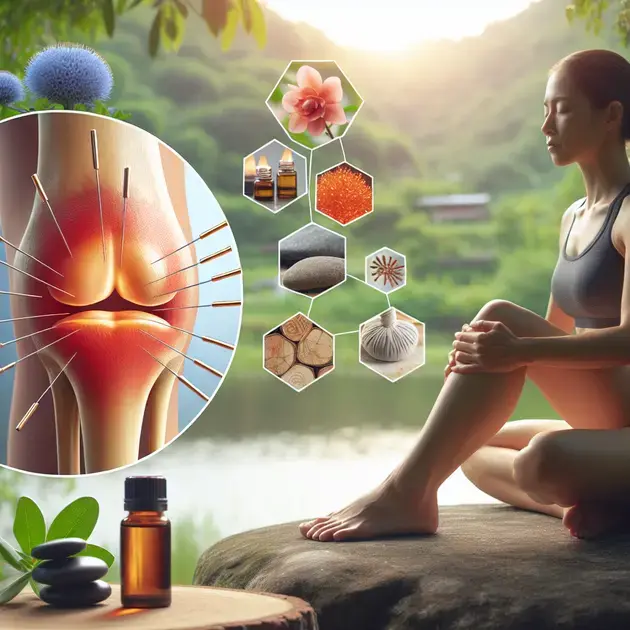Suffering from back of knee aches can be incredibly uncomfortable and disruptive to daily life. Whether caused by injury, overuse, or underlying medical conditions, finding effective remedies to soothe the discomfort is essential for regaining comfort and mobility.
In this blog post, we will explore various natural and practical solutions to provide relief for back of knee aches. From simple home remedies to lifestyle adjustments and professional treatments, there are options available to help alleviate the pain and promote healing.
Natural Remedies to Soothe Back of Knee Aches
Dealing with knee aches can be challenging, but several natural remedies can help soothe the discomfort in the back of your knees. One effective remedy is applying a cold compress to the affected area. You can easily make a cold compress by wrapping some ice cubes in a towel and gently placing it on the back of your knee for about 15-20 minutes. Repeat this process a few times a day to reduce inflammation and alleviate pain.
Another natural remedy that can provide relief is using Epsom salt baths. Epsom salt is known for its ability to relax muscles and reduce swelling. Simply add a cup of Epsom salt to a warm bath and soak your body, focusing on the knees, for at least 20 minutes. This can help improve circulation and alleviate tension in the knee area.
Additionally, incorporating anti-inflammatory foods into your diet, such as turmeric, ginger, and oily fish rich in omega-3 fatty acids, can help reduce knee pain. These foods have natural anti-inflammatory properties that can aid in managing discomfort in the back of your knees. You can find various recipes and information on the benefits of these foods on health and wellness websites like Healthline or WebMD.
Practicing gentle stretching exercises and yoga poses specifically designed to target knee pain can also be beneficial. Websites like Yoga Journal or the Down Dog app offer guided yoga sessions tailored to alleviate knee aches. By incorporating these exercises into your daily routine, you can improve flexibility, strengthen the muscles around the knees, and reduce pain and stiffness.
Incorporating these natural remedies into your daily routine can help in soothing back of knee aches and promoting overall knee health in a holistic and gentle manner.
Effective Lifestyle Adjustments for Alleviating Discomfort
When it comes to alleviating knee discomfort, making effective lifestyle adjustments can play a crucial role in managing pain and promoting healing. One key adjustment is maintaining a healthy weight to reduce stress on the knees. Websites like Mayo Clinic or CDC offer valuable information on healthy weight management techniques and the impact of weight on knee health.
Regular exercise is also essential for strengthening the muscles around the knees and improving flexibility. Low-impact exercises such as swimming, cycling, or walking can help without putting excessive strain on the knees. Fitness apps like MyFitnessPal or Fitbit provide personalized workout plans and tracking tools to support your exercise routine.
Ensuring proper footwear is another important lifestyle adjustment to consider. Wearing supportive shoes that provide cushioning and stability can help reduce knee strain during daily activities. Websites like Dr. Scholl’s or Zappos offer a wide range of footwear options designed for optimal comfort and support.
Practicing good posture and body mechanics is crucial in preventing knee discomfort. Maintaining proper alignment and avoiding prolonged periods of sitting or standing can help reduce pressure on the knees. Websites like Harvard Health or Spine-health provide resources on posture improvement techniques and ergonomics.
By implementing these lifestyle adjustments and incorporating healthy habits into your daily routine, you can effectively alleviate discomfort in the knees and promote long-term knee health and wellness.
Professional Treatments for Relief from Knee Aches
In some cases, professional treatments may be necessary to seek relief from persistent knee aches. One common professional treatment option is physical therapy, where a qualified therapist can create a customized exercise plan to strengthen the muscles around the knees and improve mobility. Websites like BetterPT or Healthgrades can help you find a reputable physical therapist in your area.
For more severe knee pain, injections such as corticosteroids or hyaluronic acid may be recommended to reduce inflammation and provide temporary relief. These injections are typically administered by a healthcare provider in a clinical setting. Information on the benefits and risks of these injections can be found on medical websites like WebMD or Healthline.
In cases where conservative treatments have not been effective, surgical options such as arthroscopic knee surgery or knee replacement may be considered. Consulting with an orthopedic specialist is essential to determine the most appropriate surgical intervention based on your individual condition. Websites like OrthoInfo or AAOS offer comprehensive information on various orthopedic procedures.
When considering professional treatments for knee aches, it is important to consult with healthcare professionals and explore all available options to find the most suitable treatment plan for your specific needs and condition.
**Alternative Therapies for Easing Knee Aches**
Acupuncture
Acupuncture is a popular alternative therapy for easing knee aches. This traditional Chinese medicine technique involves the insertion of thin needles into specific points on the body to help alleviate pain and promote healing. When it comes to knee aches, acupuncture can help improve blood flow, reduce inflammation, and release endorphins, which are natural pain-relieving chemicals in the body. Sessions are usually relaxing and can provide significant relief for individuals suffering from knee discomfort.
Step-by-step guide:
To experience the benefits of acupuncture for easing knee aches, you can follow these steps:
- Research and find a licensed acupuncturist with experience in treating knee pain.
- Schedule a consultation to discuss your knee issues and goals for treatment.
- During the acupuncture session, relax and allow the acupuncturist to insert the needles at appropriate points on your body.
- Feel the sensation of relaxation and potential pain relief as the treatment progresses.
- Follow any post-treatment recommendations provided by the acupuncturist for optimal results.
Essential Oils
Essential oils have been utilized for centuries for their therapeutic properties, including pain relief. Some essential oils, such as lavender, peppermint, and eucalyptus, can be beneficial for easing knee aches. These oils can be applied topically to the skin after being diluted with a carrier oil, or they can be used in aromatherapy diffusers for inhalation. The soothing scent and properties of essential oils can help reduce inflammation, improve circulation, and alleviate discomfort in the knees.
Step-by-step guide:
To use essential oils for easing knee aches, you can follow these steps:
- Select high-quality essential oils known for their pain-relieving and anti-inflammatory properties.
- Dilute the essential oil with a carrier oil, such as coconut or jojoba oil, to prevent skin irritation.
- Gently massage the oil mixture onto the affected knee, focusing on areas of pain or tension.
- Consider incorporating aromatherapy by diffusing the essential oil in the room to benefit from its scent and properties.
- Repeat the application as needed for relief, and adjust the concentration based on your skin sensitivity.
Conclusion
In conclusion, alternative therapies such as acupuncture and essential oils offer promising options for easing knee aches. Acupuncture, a traditional Chinese medicine technique, can enhance blood flow, reduce inflammation, and trigger the release of endorphins, providing natural pain relief. Sessions with a skilled acupuncturist can be not only therapeutic but also relaxing, offering significant relief to individuals struggling with knee discomfort.
Step-by-step guide for Acupuncture:
For those considering acupuncture for knee aches, the process involves researching and selecting a licensed acupuncturist experienced in treating knee pain. By scheduling a consultation and allowing the insertion of fine needles at specific points on the body, individuals can experience relaxation and potential pain relief during and after the sessions. Following post-treatment recommendations further enhances the effectiveness of this therapy.
Step-by-step guide for Essential Oils:
On the other hand, essential oils like lavender, peppermint, and eucalyptus, known for their therapeutic properties, offer a natural approach to alleviating knee discomfort. These oils, when applied topically or diffused through aromatherapy, can aid in reducing inflammation, improving circulation, and easing knee pain. By selecting high-quality oils, diluting them with carrier oils, and incorporating them into a regular self-care routine, individuals can benefit from the soothing properties these oils provide.

